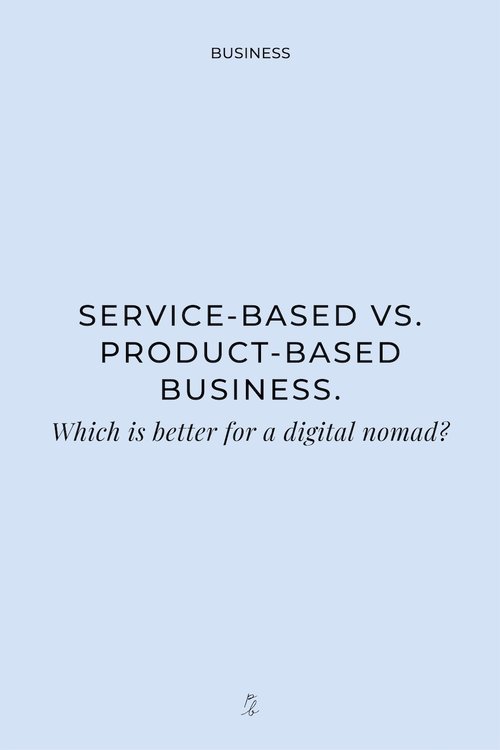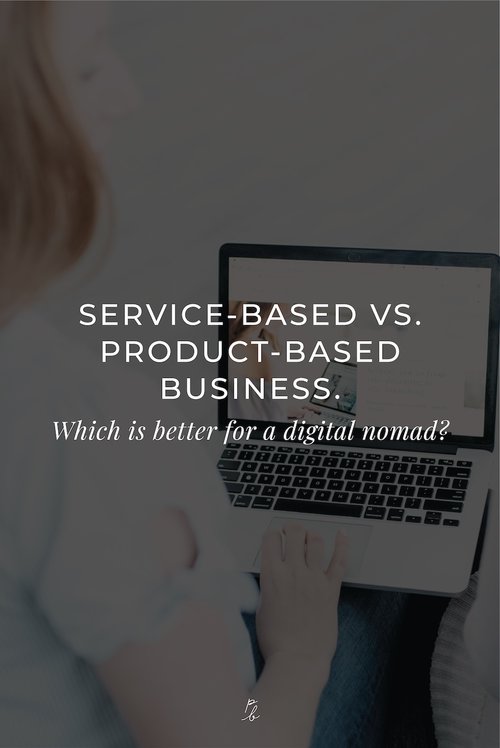Service-based vs. product-based business. Which is better for a digital nomad?
So you want to run your business from the road, travel around and do the whole digital nomad thing, eh? I totally understand your desire and am all for you making your working and traveling dreams come true!
Today I want to talk about which type of business is most ideal for your new digital nomading lifestyle.
The 2 primary types of businesses are service-based and product-based. We’re going to go into each and talk about the pros and cons each will create in terms of your lifestyle.
(Oh and btw, if you haven’t picked your business idea yet, my Online Business Matchmaker training will help out big time with nailing your idea. So it’s worth enrolling in - it’s free!)
Running a service-based business as a digital nomad:
Pros:
High ticket price: The good thing about offering 1:1 services to your clients is that these tend to command a pretty high price. After-all, you’re giving them direct access to you and you’re doing the work for them. 1:1 services tend to cost the most of anything you could buy, because you’re in a way buying an entrepreneur’s time, which is the most valuable currency.
Because services command a pretty high price, working with just one client could easily cover your business and life expense for a month or two. As a Squarespace website designer, I worked on web design projects starting at a minimum of $5,000 up to $9,000.
I could easily live off that amount for a couple months, so it really didn’t take a whole lot of clients to keep my business going and me traveling.
Cons:
High-pressure to perform: Now on the other side of the coin, if someone just dropped 9k with you, they’re going to have some high expectations that you do a darn good job for them. That means you’ve got to make working with you as easy as possible, and ensure that your digital nomading lifestyle doesn’t affect your project or your client at all.
That means things like you’ve got to ensure you’ve planned ahead and didn’t schedule a call with your client until well after you arrival somewhere in case a flight delay happens, so you don’t need to reschedule your client. You need to work ahead so in case typical digital nomad problems arise - like say a monkey eating through the fibre optic cables at your coworking space which makes the wifi go down (real situation that happened to a friend) - you won’t be behind on the work your client is expecting. You’ve also got to do phone calls in whatever time is most convenient for them (which might mean you’re up at 3 AM because of time zones - more on that later.)
Time zone problems: (I’m assuming that most of your clients will be in USA/Canada.) In this case, you can either decide to digital nomad around South America so there’s no massive time difference, or if you do want to travel somewhere else, you’re going to pay the “expat tax”. That is, you’re going to be up at super weird hours to meet your client on their schedule, during their 9-5. If you’re a night owl and regularly stay up until 3 AM, no problem. If you like to have a normal schedule, 5 AM calls will throw it off regularly which gets pretty annoying. (But is still totally worth it IMO.)
Many digital nomads who have been on the road for a while specifically plan their business around time-zone problems, so this is something you might want to start doing as well.
Look at your process and try to determine if you can eliminate phone calls. Maybe a meeting you normally do on a call (say you’re giving a tutorial on something or are reporting ROI metrics from the weeks marketing efforts) this could instead be recorded as a video with Loom and sent to your client, eliminating the need for a meeting all together.
Running a product-based business as a digital nomad:
Pros:
Lower ticket price: Products tend to be cheaper than services. Your customer isn’t getting your individual time and eyes on their work, maybe you’re just teaching how something is done with your product, but not doing it for them. Or you’re just selling them a generic mug instead of a customized, hand-made mug. You get the idea.
This commands a lower price point, but you can sell in bulk, thereby earning as much if not a lot more than a service-based business. (I quadrupled my revenue when I switched from services to digital products.)
Fulfilling orders of digital products & dropshipped products: There’s a few different types of product-based businesses. Two of them are ideal for digital nomading, one I’m afraid is pretty much impossible (to run solo that is.)
If you’re selling digital products, those area ideal as a digital nomad. You just need to set it up so people can purchase on your site and then have their digital product automatically sent to them. (You can do this with Squrespace e-commerce {use code PAIGE10 for 10% off Squarespace}, Teachable, Podia or SendOwl btw.)
In terms of your life as a digital product seller, you’re basically spending time building a brand, creating your digital products and then doing marketing and customer service. All of these can easily be done from anywhere, anytime.
If you’re selling physical products, drop-shipping is the way to go. That means once an order is placed, a fulfillment center is creating the items, packaging them up and sending them out. You’ll obviously need to pay for this convenience of the drop shipping center doing the fulfillment for you, but it’s very easy to run. Again, in this case you’ll spend your time building a brand, creating new products, marketing and maybe customer service too.
Cons:
Lower ticket price: Unlike services where selling 1 service to 1 client could cover your cost of living for a month or two, that’s unlikely with products which tend to be cheaper. So, you basically need a bigger audience to sell to, meaning you’ve got to spend time building that up.
Fulfilling orders of physical products yourself:
Lastly, you could sell physical products yourself. This is the least optimal idea for digital nomads. You’d have to carry your product with you from place to place (and who ever wants to drag more suitcases than necessary through an airport - plus depending on the size of your product, this could actually be impossible), and it’d make shipping a nightmare. Your customers want to know how long the product will take to reach them, and if you’re always moving and sending stuff from different countries, that’s not going to be possible to figure out.
So basically, if you want to sell physical products yourself, you could batch create them at home, and then set off on your travels and have a friend or family member back home fulfill the orders. This again will cost you money and eat away your profits by having to pay Mom to head to the USPS every few days to ship packages.
So which is better for a digtial nomad, a service-based or product-based business?
I’d say if you want to get on the road right away, starting with services is going to enabl you to get going on your digital nomad dreams fastest, because you just need maybe 1 client to cover you life expenses for a month or two.
Granted, the real freedom and exponential income potential comes with a product-based business.
My suggestion would be this: Start with services. Work on your projects for your clients AND building up an audience (read: email list) related to your topic. Then once you’ve built the audience/email list, move over to products.





